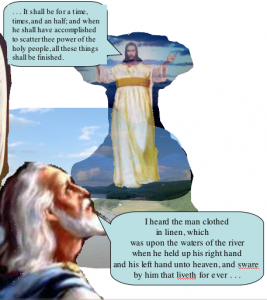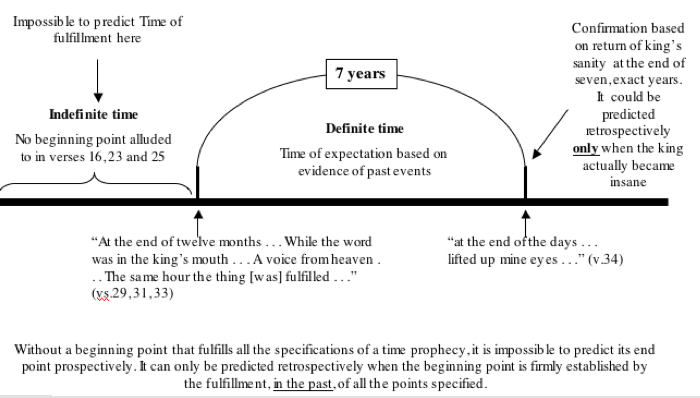At first glance, a quick survey of this chapter seems to bear no relationship to Chapter 9, with the exception of Verse 7 where “the voice of the seventh angel” is heard. The “seventh angel” is clearly sequential to the sounding of the “sixth angel” in Chapter 9. Therefore, John is introducing some additional material, in a parenthetical manner, to the sixth trumpet scenario.
The Commentary agrees, suggesting that “Chapters 10:1 to 11:14 constitute a parenthesis between the sixth and seventh trumpets.” [1] However, since it is clear that the “trumpets” are post probationary, it is more likely that the parenthetical portion must end in Chapter 11:6, where the testimony of the two witnesses “is finished.” That suggests that Revelation 11:7-14 actually completes the scenario of the sixth trumpet.
Verses 1, 2: And I saw another mighty angel come down from heaven, clothed with a cloud: and a rainbow was upon his head, and his face was as it were the sun, and his feet as pillars of fire: and he had in his hand a little book open: and he set his right foot upon the sea, and his left foot on the earth,
Other than the angels who sounded their trumpets in the previous chapter, this “mighty angel,” who descends from above, is an additional “angel.” In fact, He “was no less a personage than Jesus Christ” Himself! [2] Only His voice was heard coming from the “four horns of the golden alter” (Revelation 9:13), where, before, He was present (Revelation 8:3). Here, his reappearance, augmented by the beauty of a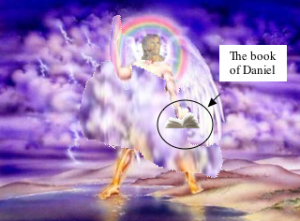 rainbow, glory of the sun, and feet looking like pillars of fire, assures us that He has not abandoned the earth and is still much concerned with what is going on. His body “clothed with a cloud,” suggests there is some mystery regarding His true identity, as was demonstrated during the foregoing trumpet scenario.
rainbow, glory of the sun, and feet looking like pillars of fire, assures us that He has not abandoned the earth and is still much concerned with what is going on. His body “clothed with a cloud,” suggests there is some mystery regarding His true identity, as was demonstrated during the foregoing trumpet scenario.
Next, we see a “little book” lying open in His hand with His right and left feet planted on the sea and on the earth, evidently representing the global relevance of the message contained in this book.
Verses 3, 4: And cried with a loud voice, as when a lion roareth: and when he had cried, seven thunders uttered their voices. And when the seven thunders had uttered their voices, I was about to write: and I heard a voice from heaven saying unto me, Seal up those things which the seven thunders uttered, and write them not.
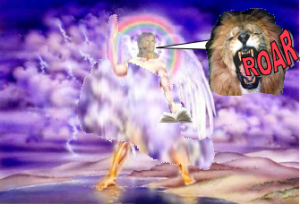 The first words Jesus uttered had the sound of a roaring lion which initiated the roaring of “seven thunders.” John, who had been bidden to “write the things which thou hast seen” (Revelation 1:19) and was here poised to continue, was immediately warned not to write, and to “Seal up” what he saw (or heard?) from the thunders. The command to “seal up” should be compared to the words of Daniel, many years before, when he was told that the words he heard, which he failed to understand, were to be “sealed till the time of the end” (Daniel 12:8, 9), the “time,” actually, in which we find ourselves today! Come to think of it, the “seven thunders” sound, as it were, very much like the sound of the “seven trumpets!” If that were the case, however, John had already written about the trumpets thus far, and we must conclude that the thunders furnished additional information that we are not privy to.
The first words Jesus uttered had the sound of a roaring lion which initiated the roaring of “seven thunders.” John, who had been bidden to “write the things which thou hast seen” (Revelation 1:19) and was here poised to continue, was immediately warned not to write, and to “Seal up” what he saw (or heard?) from the thunders. The command to “seal up” should be compared to the words of Daniel, many years before, when he was told that the words he heard, which he failed to understand, were to be “sealed till the time of the end” (Daniel 12:8, 9), the “time,” actually, in which we find ourselves today! Come to think of it, the “seven thunders” sound, as it were, very much like the sound of the “seven trumpets!” If that were the case, however, John had already written about the trumpets thus far, and we must conclude that the thunders furnished additional information that we are not privy to.
Here is what White says: “The special light given to John which was expressed in the seven thunders was a delineation of events which would transpire under the first and second angels’ messages. It was not best for the people to know these things for their faith must necessarily be tested. In the order of God most wonderful and advanced truths would be proclaimed. The first and second angels’ messages were to be proclaimed, but no further light was to be revealed before these messages had done their specific work. This was represented by the angel standing with one foot on the sea, proclaiming with a solemn oath that time should be no longer.” [3] The subject of the first and second angels’ messages is way ahead of our study, thus far, and we will address it later. But the “time” spoken of is in Verse six of this chapter. In the meantime, let’s examine Verse 5.
advanced truths would be proclaimed. The first and second angels’ messages were to be proclaimed, but no further light was to be revealed before these messages had done their specific work. This was represented by the angel standing with one foot on the sea, proclaiming with a solemn oath that time should be no longer.” [3] The subject of the first and second angels’ messages is way ahead of our study, thus far, and we will address it later. But the “time” spoken of is in Verse six of this chapter. In the meantime, let’s examine Verse 5.
Verse 5: And the angel which I saw stand upon the sea and upon the earth lifted up his hand to heaven,
Compare this with “the man clothed in linen, which was upon the waters . . . when he held up his right hand and his left hand unto heaven, and sware by him that liveth for ever, that it shall be for a time, times, and an half; and when he shall have accomplished to scatter the power of the holy people, and all these things shall be finished” (Daniel 12:7). “These things” are obviously the things Gabriel spoke of in Verses 1- 4 when Michael stands up at the end of time or when Jesus casts the censer into the earth (Revelation 8:5). At this point, in John’s vision, Jesus holds only one “hand up” because the other had the “little book” that was open. Nevertheless, this is obviously the same setting that was shown to Daniel.
Verse 6: And sware by him that liveth for ever and ever, who created heaven, and the things that therein are, and the earth, and the things that therein are, and the sea, and the things which are therein, that there should be time no longer:
Again, note the similar words spoken to Daniel (Daniel 12:7). But what is meant by the last phrase: “that there should be time no longer”? While the angel Gabriel referred Daniel to “time times, and an half” which would take place after “power” was to be denied the “holy p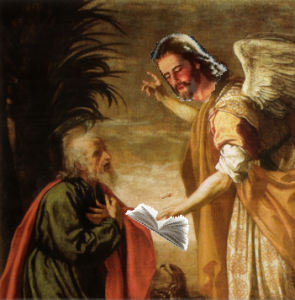 eople,” lasting for that specified length of time, Gabriel tells John “time” would be “no longer”! White comes to the rescue when she states: “This time which the angel declares with a solemn oath, is not the end of this world’s history, neither of probationary time, but of prophetic time, which should precede the advent of our Lord.” [4] While she says more, it is well to stop and consider the matter of “prophetic time” as spelled out in Numbers 14:34 and Ezekiel 4:6, namely: each “day” represents a “year.” According to Gabriel (as substantiated by White), that method of time reckoning ended in 1844. Therefore, from 1844 onwards, time prophecy should be understood in literal, day-for-a-day time and that the “time, times, and an half” of Daniel 12:7 should be understood as three and an half years of literal time.
eople,” lasting for that specified length of time, Gabriel tells John “time” would be “no longer”! White comes to the rescue when she states: “This time which the angel declares with a solemn oath, is not the end of this world’s history, neither of probationary time, but of prophetic time, which should precede the advent of our Lord.” [4] While she says more, it is well to stop and consider the matter of “prophetic time” as spelled out in Numbers 14:34 and Ezekiel 4:6, namely: each “day” represents a “year.” According to Gabriel (as substantiated by White), that method of time reckoning ended in 1844. Therefore, from 1844 onwards, time prophecy should be understood in literal, day-for-a-day time and that the “time, times, and an half” of Daniel 12:7 should be understood as three and an half years of literal time.
Verse 7: But in the days of the voice of the seventh angel, when he shall begin to sound, the mystery of God should be finished, as he hath declared to his servants the prophets.
Here, in this parenthesis (Revelation 10:1-11:6), in the midst of the sixth trumpet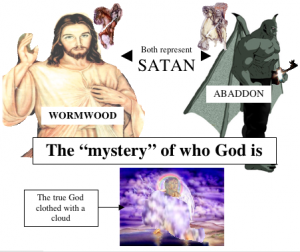 scenario (Revelation 9:12-21; 11:7-13), Jesus tells us he hasn’t forgotten about the trumpets and points forward to the seventh which will be referred to in the next chapter. His reference to the “mystery of God,” at this point, deals with the deceptions practiced on the world by Wormwood who goes to war with Abaddon/Apollyon. In the days of the seventh trumpet, the question of who the real God is, will be settled once-and-for-all.
scenario (Revelation 9:12-21; 11:7-13), Jesus tells us he hasn’t forgotten about the trumpets and points forward to the seventh which will be referred to in the next chapter. His reference to the “mystery of God,” at this point, deals with the deceptions practiced on the world by Wormwood who goes to war with Abaddon/Apollyon. In the days of the seventh trumpet, the question of who the real God is, will be settled once-and-for-all.
Verses 8-10: And the voice which I heard from heaven spake unto me again, and said, Go and take the little book which is open in the hand of the angel which standeth upon the sea and upon the earth. And I went unto the angel, and said unto him, Give me the little book. And he said unto me, Take it, and eat it up; and it shall make thy belly bitter, but it shall be in thy mouth sweet as honey. And I took the little book out of the angel’s hand, and ate it up; and it was in my mouth sweet as honey: and as soon as I had eaten it, my belly was bitter.
Obviously, the “little book which is open in the hand of the angel” is the book of Daniel that was specifically opened to Chapter 8:14 declaring: “Unto two thousand and three hundred days; then shall the sanctuary be cleansed.” It was assumed that the “sanctuary” was the earth and the cleansing was the earth being cleansed by fire at the second coming.
White declares: “This was the happiest year of my life. My heart was full of glad expectation. I felt great pity and anxiety for those who were in discouragement and had no hope in Jesus. As a people, we united in earnest prayer for true inward experience and the unmistakable evidence of our acceptance with God. (Ibid)
“But the time of expectation passed . . . The disappointment of God’s waiting people was great. The scoffers were triumphant and winning the weak and cowardly to their ranks. Some who had appeared to possess true faith seemed to have been influenced only by fear, and now their courage returned with the passing of the time and they boldly united with the scoffers declaring they had never been duped to really believe the doctrine of Miller, who was a mad fanatic. Others, naturally yielding or vacillating, quietly deserted the cause . . . They professed to love and long for the coming of Jesus, but when he failed to appear they seemed greatly relieved and went back to a state of carelessness and disregard of true religion. [5]
So, the failure of Christ to come at the expected time produced a mixture of responses ranging from bitter resentment at Miller’s preaching to a quiet departure from faith even to relief that He didn’t come! It was a bitter disappointment that fell upon the little flock whose faith had been so strong and whose hope had been so high. “But we were surprised that we felt so free in the Lord, and were so strongly sustained by his strength and grace . . . were perplexed and disappointed, yet we did not renounce our faith . . . we were disappointed but not discouraged; the signs of the times denoted that the end of all things was near at hand, we must watch and hold ourselves in readiness for the coming of the Master at any time. We must wait with hope and trust, not neglecting the assembling of ourselves together for instruction, encouragement and comfort, that our light might shine forth into the darkness of the world.” [6]
In essence, they went back to the scriptures to learn what went wrong, and thus they were able to fulfill the final verse of this chapter where Jesus’ words came to John:
Verse 11: And he said unto me, Thou must prophesy again before many peoples, and nations, and tongues, and kings.
“The gospel dispensation is the last period of probation that will ever be granted to men. Those who live under this dispensation of test and trial and yet are not led to repent and obey will perish with the disloyal. There is no second trial. The gospel that is to be preached to all nations, kindreds, tongues, and peoples presents the truth in clear lines, showing that obedience is the condition of gaining eternal life. Christ imparts His righteousness to those who consent to let Him take away their sins. We are indebted to Christ for the grace which makes us complete in Him.” [7]
So, this is the “dispensation” all of us are living in right now! The only “time” any of us actually have, is while we are alive.
Summary of Chapter 10: Jesus is partially “clothed with a cloud” which represents the “mystery” of His identity to the wicked. His glorious appearance, in the midst of the prevailing ignorance in the world, reassures God’s people that He is still in control. Jesus’ loud voice, followed by the thunders that John was told not to write about, is perhaps a warning that unspeakable things are coming in the future. We are then reminded of the sweet/bitter book experience representing God’s people, whom God allowed to base their expectation of His soon coming on a misunderstanding of the 2300-day prophecy (Daniel 8:14) and, finally, Jesus’ charge to His church to proclaim, during probationary time, the three angel’s messages of Revelation 14:6-11.
_______________________________________________________________________________
[1] Seventh-day Adventist Bible Commentary, Vol. 7, page 796 (right column under “1. I saw.”)
[2 – 4] Ibid, page 971
After the above quote, White goes on to explain about “definite” time. “That is, the people will not have another message upon definite time. After this period of time, reaching from 1842 to 1844, there can be no definite tracing of the prophetic time. The longest reckoning reaches to the autumn of 1844.” Therefore, she is explaining that her definition of “definite time” is the setting of a date for a prophecy to take place―in other words, time-setting. Her statement does not preclude that there will not be any more future time prophecies.
Smith confirms the generally understood meaning of prophetic time. When referring to the half an hour (Revelation 10:1) he states: “the length of this period of silence, if we consider it prophetic time, would be about seven days.” He further states: “A prophetic year is three hundred and sixty prophetic days.” Daniel and the Revelation by Uriah Smith, pages 473, 507
Here is a list of sources where White used the term “definite time:” Manuscript Releases, Vol .1, page 100; Vol. 10, pages 268, 269, 270; Vol. 16, pages 176, 177, 178; Vol. 19, page 320; Spirit of Prophecy, pages 225, 242, 290; Testimonies For the Church, Vol. 1, pages 56, 72; Vol. 4, pages 307, 308; Spiritual Gifts, Vol. 1, pages 134, 152; Vol. 2, page122; Early Writings, pages 233, 246; 1888 Sermon, page 956; Review and Herald 3-20-92; 3-22-92, 8-16-87, 8-21-88, 10-20-85; Maranatha, page 136; Evangelism, page 221; Life Sketches, pages 88 190, 221; The Great Controversy, pages 353, 370, 456; Seventh-day Adventist Bible Commentary, Vol. 6, page 1052; Vol. 7, page 971; Last Day Events, pages 32, 33, 35, 36; Selected Messages, Vol. 1, pages 75, 188, 189; Vol. 2, page 73; Signs of the Times, 4-20-76, 4-22-80, 5-11-76, 10-8-02; Christian Education, page 114; Publishing Ministry, page 18; Fundamentals of Education, page 137; 1888 Materials, page 958.
This diagram, used in Daniel 4, might be helpful here in picturing what is meant by “definite time.” It will work with any of the future time prophecies of either Daniel or Revelation. Just substitute the time period in place of the 7 years used here as an example of the application of “definite” and “indefinite” time:
[5] Signs of the Times, 3-23-1876
[6] Signs of the Times, 3-30-1876
[7] Manuscript 40, 1900; Seventh-day Adventist Bible Commentary, Vol. 7, page 971
